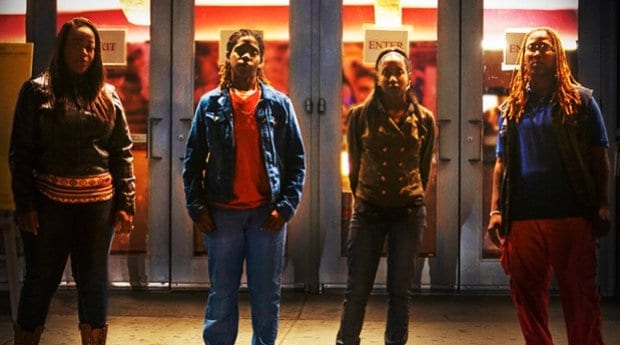
Credit: Lyric Cabral

Credit: Lyric Cabral
Reckless stereotypes, undisguised loathing of difference, and homophobia are among the themes Out in the Night explores when it revisits the case of seven lesbians arrested for fighting back against the man who attacked them in New York’s West Village in August 2006.
With few facts, the headlines trumpeted “Lesbian gang-stab shocker” and “Attack of the killer lesbians” among others. The judicial system proved no better. Footage from only two of five security cameras was presented in court, and the jury didn’t hear testimony from a male witness who came to the women’s defence. Moreover, the extent of the “victim’s” injuries was exaggerated at trial.
As Out in the Night unfolds, it becomes clear that more diligent scrutiny may have led to a different outcome for the four women who ended up in prison, with sentences ranging from three and a half to 11 years.
It is an indictment of itchy, trigger-finger journalism and reminiscent of screaming headlines in Ugandan newspapers like Rolling Stone, infamous for outing gay people, or the fast-talking, aggressive sensationalism of North America’s Fox News and CNN.
“The media doesn’t tell the whole story,” Renata Hill’s mother says after the guilty verdict is handed down. “They didn’t tell how my daughter was attacked, how she was choked. It’s called gaybashing, but they won’t call it that. They call it everything but that.”
Cruising a landscape of tractor-trailer containers, for-rent signs, elegant but worn townhouses, and people milling on the streets, the film offers more nuanced insight into the four women, their poignant and joyful lives, and their Newark neighbourhood that is a complicated blend of home and hell.
Being gay is not an issue with their families, Hill says. But venturing out of their neighbourhood is another question. “People in the north aren’t really cool with it.”
For Patreese Johnson, who has lost two brothers to the neighbourhood’s violence, self-preservation is second nature. It’s why she carried the knife that she used in self-defence against the man who attacked them, who said he wanted “some of that” as he pointed to her crotch, who spat at them, called them dyke bitches, offered to fuck them straight, and ripped a handful of dreads from one woman’s head during the street fight.
When the women ventured into the West Village, they thought they were immersing themselves in an area where people “looked like us,” where they would hit some clubs, “get a few numbers” and then go home.
Instead, their night on the town earned them charges for weapon possession, gang assault and attempted murder, with the prosecutor threatening 25 years behind bars if they didn’t plead guilty to the charges. Three of the women accepted the plea bargain. The other four rejected it, maintaining that they acted in self-defence against a gaybasher. The court incarcerated them for it.
Out in the Night
Mon, Aug 18, 9:30pm
SFU Goldcorp Centre for the Arts, 149 Hastings St


 Why you can trust Xtra
Why you can trust Xtra


